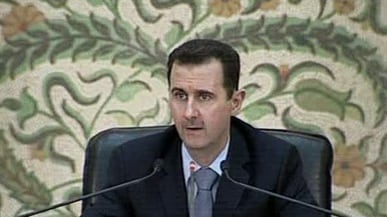The White House has been engaged in intense deliberations over the past two weeks as violence in Syria has intensified. Many senior advisers have agreed that a new round of sanctions will be necessary, according to one official. While a precise package to constrain the government is still being discussed, a more immediate consideration is how forcefully President Obama should confront President Bashar al-Assad in his wide-ranging speech on the Middle East on Thursday.

Obama hasn’t yet spoken out forcefully on Syria, sticking mostly to written statements with each escalation of violence. Much of what’s come from the West Wing has been statements urging Assad’s government to respond to the Syrian people’s grievances.
The most vocal criticism has come from Press Secretary Jay Carney, who told reporters Tuesday that “the window is narrowing for the Syrian government to shift focus away from repressing its people and toward meeting the legitimate aspirations of its people.” He also said that the administration was “looking at additional measures that we can take, and we continue to enforce the measures already taken.”
Behind the public threats from the podium, there’s a quieter consideration that sanctions might not be the most effective strategy. According to one official, there’s a general acknowledgment among those handling the review, which is being run by National Security Adviser Tom Donilon, that a tighter economic chokehold could have an effect similar to what happened with Libya. That is to say, effectively irk the leader, who’s insulated from his country’s economy, and who would in turn exact revenge with bigger crackdowns on protesters. A direct confrontation similar to the way Obama addressed Libya’s Muammar Gaddafi in March—saying he “ must go”—could have greater impact, but perhaps at greater cost.
One looming risk is the potential need for international intervention. American war fatigue was apparent when the U.S. formed its coalition with NATO partners to pressure Gaddafi’s government. The White House, in fact, avoided the word “war” at all costs. While that third international commitment—beyond Iraq and Afghanistan—was a hard sell, a fourth would be inconceivable, especially days after the U.S. hit its debt ceiling, and while Congress takes a hard look at the nation’s books.
America’s war fatigue means a fourth intervention would be inconceivable, especially days after the U.S. hit its debt ceiling.
What’s more, regional complexities highlight just how unique and problematic Syria is. While not a formal U.S. ally, the country does provide relative stability to the region, and it has a population—just over 21 million—that’s almost four times Libya’s. Signaling Syria’s regional importance, Nancy Pelosi visited with Assad in Damascus in 2007 when she was House speaker, despite protests from the Bush White House.
But Syria is also the strongest—perhaps the only—ally of Iran in a volatile area generally hostile to Persians, especially Shia Persians. Iran had begun to coordinate, with Damascus, construction of a naval base near the Syrian coast this year. If the Syrian government were toppled, the plan could be nixed—which would deepen Tehran’s anger toward the West. Intervening in Syria, one official explained earlier this week, could lead to a “much bigger commitment than we’re looking for.” Tony Badran, an analyst with the Foundation for Defense of Democracies, told USA Today this week that any forceful action in Syria would be an admission that the longstanding policy of engagement with Syria as a means to rein in Iran has been a waste of time and money.
The White House has said Obama’s speech Thursday will range widely over Middle East and North Africa issues, from the Arab Spring revolutions to the Israeli-Palestinian conflict. The address also is expected to focus on the president’s promised deadline to begin withdrawing troops from Afghanistan this summer, as well as ongoing fallout in the region from the killing of Osama bin Laden.
Daniel Stone is Newsweek's White House correspondent. He also covers national energy and environmental policy.





